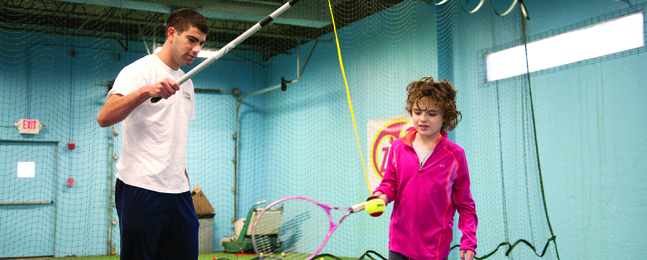In This Game, Love Isn’t Zero
Brandeis tennis aces bring essential skills to disabled kids.

Photo by Heratch Ekmekjian
John Ostrowsky '13 works with 8-year-old Zoe Spiegel
by David Nathan
While coaches lob tennis balls to eager kids lined up in a neat row waiting to smack volleys over the net, three boys chase errant shots, seemingly more interested in collecting balls than hitting them. Two coaches pair up nearby to help an 8-year-old girl position her feet properly to hit a forehand shot off a tee. And on another court, a coach reminds a boy named Ben of the tasks he must complete before earning his coveted treat break.
Welcome to the organized chaos of ACEing Autism, a tennis class in which the teachers appear to learn as much as the students. Although the 4-year-old program was established to help children on the autism spectrum improve their fitness, coordination and social skills, the volunteers from the Brandeis men’s and women’s tennis teams who serve as coaches may be the biggest beneficiaries. Call it mutually constructive community service.
“It doesn’t matter what skill level the kids come in with. Over time you see them make progress,” says Jon Ostrowsky ’13. “We don’t compare them; we are concerned with their individual skill sets. That lesson is applicable to us in sports, school and life: Focus on your progress and don’t worry so much about what someone else is doing. You can only control yourself.”
Founded in 2008 by tennis pro Richard Spurling and his wife, child neurologist Shafali Jeste, ACEing Autism began with two sites in the Boston area and has expanded to Los Angeles and South Florida. For the students, the program represents just one component of an extensive therapeutic protocol.
“These kids are so overbooked with therapists from Monday to Friday that this is a chance to have some fun and run around,” Spurling says. “Tennis is perfect for this type of activity because they get the immediate gratification of hitting the ball.”
For 10 Sundays each fall and spring, members of coach Ben Lamanna’s Brandeis tennis teams make the half-hour trip to the Longfellow Club in neighboring Wayland to work with a few dozen children whose autism diagnoses range from moderate to severe. A typical 50-minute session includes warm-ups, stroke work, hand-eye coordination activities and group games, all designed to help the children develop their social skills by taking turns, working in teams and following instructions. At least one coach is assigned to every student.
“Tennis is a mechanism for these kids to learn how to socialize and communicate,” says Ostrowsky, who first coached in the program as a high school student in nearby Newton. “It gives them a chance to improve their social skills, learn with friends and from one another, and have fun.”
Roberta Bergstein ’14 of Hingham, Mass., also served as an ACEing Autism coach while in high school. The experience was so powerful that she chose to write about it in her Brandeis admissions application essay. “I was nervous at first, and it can be frustrating when the kids don’t focus, but it’s rewarding to see the impact you have on these kids,” Bergstein says. “You can make a difference.”
Bergstein grew close with one of her students, a girl named Lauren. “I remember she first came in clenching her dad’s hands and not wanting to be there, but I worked with her and she grew to trust me. It was very gratifying.”
The mother of Zoe Spiegel has seen her daughter develop both her social skills and her coordination through the program the 8-year-old calls “tennis racquet-ball.” “She’s very engaged and enjoys being on the court with other kids,” Mira Spiegel says. “It’s a nice break and a chance for her to do something recreational.
“She comes off the court with a big smile. What else can you ask for?”
